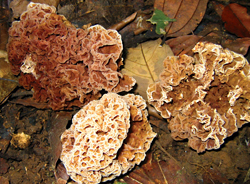
Photo by Dennis Desjardin
Realizing that a newly discovered species represents a unique organism that is new to science usually takes years of hard work in the lab. It requires analyzing all cell-types and tissues, sequencing DNA from several genes, and comparing the results to those generated from all known species belonging to the genus in which your "new" species belongs. The most fun discoveries are those that resemble a surreal game of Mr. Potato Head (all of the parts are there but they are organized in a bizarre way).
I remember my initial excitement in discovering a unique organism that looked like a luffa sponge in Khao Yai National Park in central Thailand. I thought, "You should be in the ocean, not here deep in the forest." Then bewilderment set in. Why was this fungus soft and rubbery like a sponge that could be squished, drained of water and then return to its normal size? So unmushroom-like. Where were its gills and stem, why did it stink like freshly laid asphalt, and why did it turn bright purple in alkaline solution?
Insight finally arrived in the lab where it was revealed that the organism had cell-types and tissues similar to those of a few genera of bolete mushrooms, and the molecular data suggested to what it might be related. But what was it, and had it been described before? My colleagues and I were looking at many months of work studying potentially similar organisms, anxiously awaiting consensus data that might support our supposition that it was a new species.
I was joyous when all of the analyses were completed and indicated that not only was this organism a new species, it represented a new genus. One year later, our publication describing the new genus and species, Spongiomorpha thailandica, was published and I felt satisfaction that I'd been lucky enough to have discovered it and had persevered through the analyses stages to document that it represented a new lineage of organisms. Gratification from discovery is not instantaneous, but rather multi-textured and revealed over time, like the flavors of a fine wine.
-- SF State Professor of Biology Dennis Desjardin (B.S., '83; M.A., '85) has discovered and formally described five new genera and approximately 200 new species of mushrooms from his fieldwork in underexplored forests around the world.